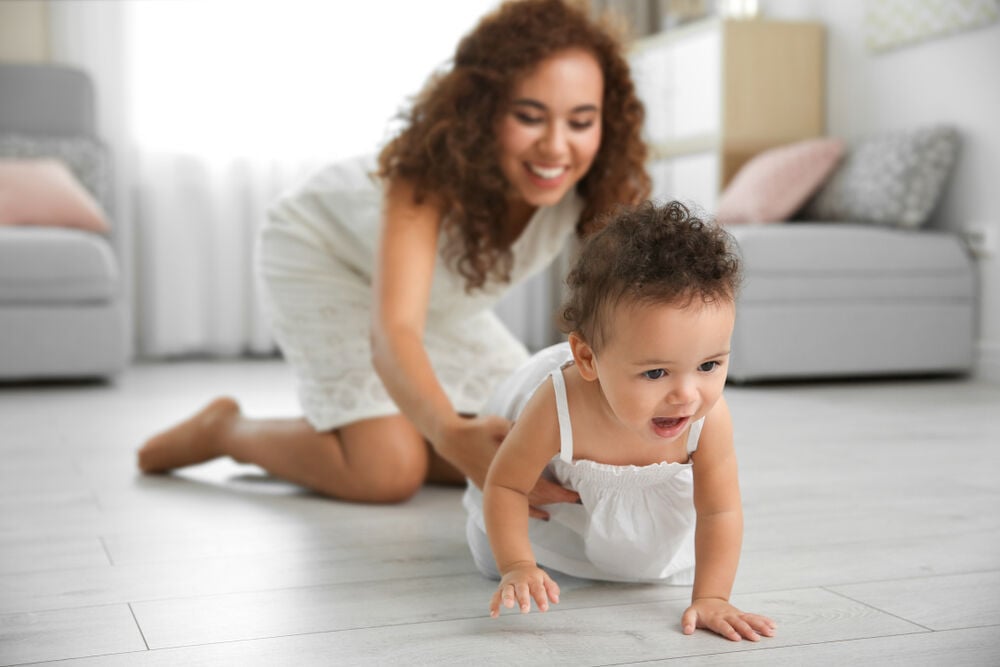By the time your baby is eight months old, they are probably moving around a bit, eating solid foods, and sitting up by themselves. What will your baby be like at eight months? What are some eight-month developmental milestones? Keep reading to get the answers to both questions and more.
-
Tracking cycle
-
Getting pregnant
-
Pregnancy
-
Help Center
-
Flo for Partners
-
Anonymous Mode
-
Flo app reviews
-
Flo Premium New
-
Secret Chats New
-
Symptom Checker New
-
Your cycle
-
Health 360°
-
Getting pregnant
-
Pregnancy
-
Being a mom
-
LGBTQ+
-
Quizzes
-
Ovulation calculator
-
hCG calculator
-
Pregnancy test calculator
-
Menstrual cycle calculator
-
Period calculator
-
Implantation calculator
-
Pregnancy weeks to months calculator
-
Pregnancy due date calculator
-
IVF and FET due date calculator
-
Due date calculator by ultrasound
-
Medical Affairs
-
Science & Research
-
Pass It On Project New
-
Privacy Portal
-
Press Center
-
Flo Accuracy
-
Careers
-
Contact Us
8-Month-Old Milestones in Baby Development: What to Expect


Every piece of content at Flo Health adheres to the highest editorial standards for language, style, and medical accuracy. To learn what we do to deliver the best health and lifestyle insights to you, check out our content review principles.
How to know if your baby is developing normally
If you’re like most parents, you’re probably wondering if your baby is developing normally and curious about what milestones to expect at eight months. There are some signs you can look for to see if your baby is reaching typical 8-month-old milestones. Your baby’s pediatrician can also help you keep track of your baby’s development.
A healthy 8-month-old baby is probably going through about eight or more diapers a day. If your baby is going through fewer diapers, particularly if your baby isn’t eating well, make sure to get them checked with the pediatrician.
Most 8-month-old babies are starting to sleep longer through the night more regularly. Eight-month babies typically sleep for about 13 to 14 hours per day. If your baby is having trouble sleeping, your doctor can make sure nothing is amiss and suggest some things to try.
As your baby is growing older, they are becoming more alert and beginning to notice things happening around them.
Remember, no one is the same!
Remember that every infant is different. Although milestones are exciting, not every baby meets every milestone. Some babies skip crawling entirely before beginning to walk when they’re around one year old. If your child hasn’t reached a milestone yet, chances are they will likely make it up very soon. It’s quite common to see a couple of months’ difference in milestones from baby to baby.
8-month-old baby milestones

Within eight months, you’ve probably seen your child accomplish some extraordinary things. With these tremendous milestones achieved, you may be wondering what to expect next. Here are some typical eight-month-old baby milestones to look forward to:
Motor skills
An eight-month-old baby is getting lots of new energy and strength. By this age, your baby is probably able to:
- Sit independently
- Get onto their hands and knees
- Move from sitting to crawling (position)
- Crawl forward on their belly (army crawl) or hands and knees
Most babies start crawling around this age. An 8-month-old baby is able to pair up their senses with their motor skills. They may be able to spot a toy far away in the room, crawl over, and get it. They may also be able to play with toys, hurling a ball across the room, hitting blocks together, or fitting cups into each other.
The pincer grasp — using a finger and thumb — becomes better developed in most eight-month-old babies. They may be able to pick up even very small things. And since your baby is exploring the environment through all their senses, they may be putting these objects in their mouth.
Flo is by far my favorite period tracker. It has so many more options than most of the other apps and it's always accurate, unlike every single other tracker I've tried. I've been using Flo for a year and don't ever see myself switching.
Take a quiz
Find out what you can do with our Health Assistant
Eating habits and needs
Your 8-month-old baby may be consuming between 24 and 32 ounces of breast milk or formula every day. This is a good age to start including a variety of food items in their meal, such as fruits and vegetables, baby cereal, and pureed or mashed meats. As the quantity of solid foods increases, the amount of formula or breast milk decreases.
You may observe that by this age, your child’s diet has started to shift more towards solid foods. At this age, they still need about 16 to 20 ounces of formula or breast milk, though. You can introduce cow milk after their first birthday. Honey is another food that should wait until your baby is one year old.
Because of the development of their pincer grasp and chewing skills, your child might start self-feeding with simple finger foods. You can consider adding simple finger foods such as cut-up toast, bananas, cereal, well-cooked meat, and pasta.
Make sure to cut the food items into bite-sized pieces and avoid choking hazards like hot dogs, popcorn, raw carrots, blueberries, grapes, and raisins. Also, make sure to stay with your 8-month-old baby throughout mealtimes.
Sleeping times
An eight-month-old baby sleeps for about 13 to 14 hours a day. They might take two naps during the day, one in the morning and the other in the afternoon. An average nap is about an hour, but for some babies, a 20-minute nap may suffice.
One interesting 8 months milestone is object permanence. Now your baby understands that you keep existing even though you aren’t in view. Because of this, your child may start developing separation anxiety. This can make naps and bedtime more difficult.
Separation anxiety can sometimes last until children are two years old. But you shouldn’t worry too much if your child fusses and cries when you leave the room. They usually stop crying after a couple of minutes. Being consistent and firm in your routine can help everyone adjust.
Communication skills
Your eight-month-old baby is developing more awareness of their surroundings and a greater sense of self. They start understanding what object permanence is and anticipating daily routines. They know that the crib means bedtime, the high chair means meals, and so on.
One common 8 months milestone is that babies start realizing what they like and dislike. This is why you may have seen a frown on their face when you gave them strained broccoli and a smile when you replace it with sweet potato.
An eight-month-old baby’s babbles may start making more sense as your child starts developing better language skills. For instance, they may start saying “dada” or “mama” and also understand some basic words like “no,” “milk,” and “bye-bye.”
How to make your home safe for an 8-month-old baby
Since an 8-month-old baby might have started crawling, you need to make your home safe. Here are some steps to make your house baby-proof:
- Put away all cosmetics, poisons, and cleaning products.
- Lock up the kitchen and bathroom cabinets.
- Cover all open outlets.
- Block any stairs in your house with gates.
- Make sure that no cords from blinds or electrical appliances are dangling anywhere in the house.
- Clear away any tiny objects lying around the house, such as coins or small toys.
- Keep doors to bedrooms and bathrooms closed.
Most eight-month-old babies are probably starting to move around, eat solid foods, and sit up by themselves. Your child may start crawling around this age. They may also start playing with toys and picking up small things with their finger and thumb.
When your baby is eight months old, you can start introducing solid foods along with formula or breast milk into their diet. Your baby may develop separation anxiety during bedtime and naps because of their understanding of object permanence at this age. One exciting eight-month milestone is the development of more advanced language.
Make sure to baby-proof the house as your 8-month-old baby is becoming more mobile. And lastly, don’t forget that every child develops differently. Developmental milestones are meant to guide you about what to expect next and prepare for, and not cause you concern.


Hey, I'm Anique
I started using Flo app to track my period and ovulation because we wanted to have a baby.


The Flo app helped me learn about my body and spot ovulation signs during our conception journey.


I vividly
remember the day
that we switched
Flo into
Pregnancy Mode — it was
such a special
moment.
Real stories, real results
Learn how the Flo app became an amazing cheerleader for us on our conception journey.




